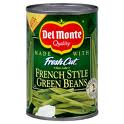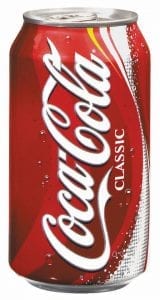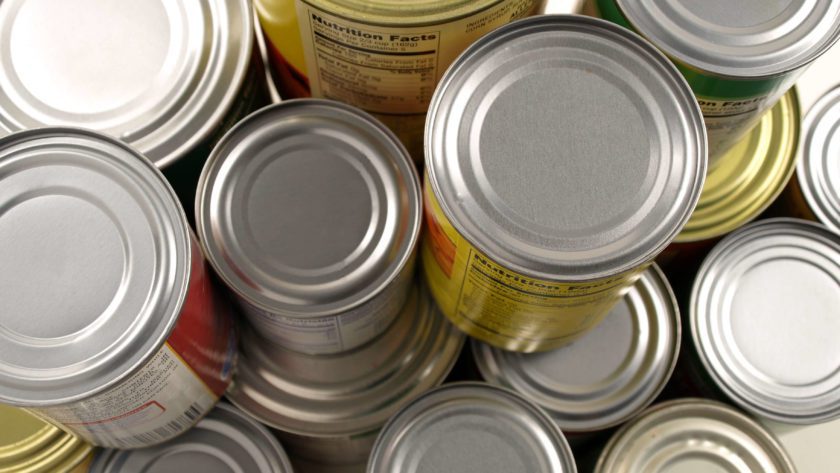UPDATE: Potentially harmful levels of the chemical bisphenol-A (BPA), a known endocrine disruptor, found in common food can liners can negatively affect hormonal systems. According to BPA studies, “93 percent of Americans tested have detectable levels of BPA in their urine, suggesting that people are consistently exposed and re-exposed to BPA…”. Evidence suggests that BPA can cause harmful health effects, such as:
- Breast and prostate cancer
- Infertility
- Type 2 diabetes
- Obesity
- Asthma
- Attention deficit disorder
A decade ago, researchers of the Work Group for Safe Markets, a coalition of public health and environmental health groups, tested 50 cans for BPA contamination. BPA is the key compound in epoxy resin linings that keeps food fresher longer. The chemical lining also prevents the food from interacting with the metal and altering the taste.
The canned foods were collected from home pantries or kitchen cupboards in 19 U.S. states and one Canadian province. They were brand name fish, fruits, vegetables, beans, soups, tomato products, sodas, and milks, which are eaten daily by many Americans. They found 92% of the cans leached BPA from the can linings into the food. If consumed for three meals every day, that could easily add up to levels associated with cancer and reproductive problems in lab studies.
 Canned foods with the highest levels of BPA (above 100 ppb):
Canned foods with the highest levels of BPA (above 100 ppb):
- DelMonte French Style Green Beans: 1,140 ppb (pantry) and 296.2 ppb (store)
- Great Value (Walmart’s in-store brand) Sweet Peas: 329.3 ppb (store)
- Healthy Choice Old-Fashioned Chicken Noodle Soup: 323.6 ppb (pantry)
- Healthy Choice Old-Fashioned Chicken with Rice Soup: 172.4 ppb (store)
- Campbell’s Cream of Mushroom Soup: 130.4 ppb (pantry)
- Campbell’s Chicken Noodle Soup: 120.7 ppb (pantry) and 127.5 ppb (store)
 Canned foods with the lowest levels of BPA (below 2 ppb – values below the 0.5 ppb level of quantification are estimates, indicated by an asterisk. ND means BPA was not detected.):
Canned foods with the lowest levels of BPA (below 2 ppb – values below the 0.5 ppb level of quantification are estimates, indicated by an asterisk. ND means BPA was not detected.):
- Coca-Cola – diet, caffeine-free: 0.4 ppb* (pantry) and ND (store)
- Coca-Cola – diet: 0.7 ppb (pantry) and ND (store)
- Coca-Cola Classic: 0.4 ppb* (pantry) and 0.2 ppb (store)
- Star-Kist Tuna: 0.7 ppb (pantry) and 1.6 ppb (store)
- DelMonte Yellow Freestone Peaches in Light Syrup: 1.2 ppb (pantry)
- Muir Glen Organic Fire Roasted Crushed Tomatoes: 1.9 ppb (pantry)
The Grocery Manufacturers Association (GMA), however, affirms that… ” there is no new science in the National Workgroup for Safe Markets’ report – all of the credible information in the report is well known to regulatory agencies and has been considered in their review and affirmation of the safety of BPA”.
Robert E. Brackett, GMA’s senior vice president and chief science and regulatory affairs officer said until more definitive regulatory agency studies are completed, GMA will rely on the current and recently reaffirmed regulatory determinations by FDA that foods in cans with linings that utilize BPA are safe.
UPDATE: EWG Targets Brands Still Using Toxic BPA in Canned Food

Karen’s Fit Tip: While the debate and research continues, choose foods in glass jars or cardboard packs or buy Eden Foods® whenever possible – especially if you’re pregnant. Eden Foods began using BPA-free cans in April 1999 although these cans cost 14% more than standard industry BPA-containing cans.
- Write to companies and ask them what linings they use in their canned foods.
- The canning industry has no suitable can for high-acid food like tomatoes, so
- Choose glass jars or Tetra-paks for high-acid food like tomatoes. The canning industry has no suitable can for such foods.
- Buy frozen produce and fruits.
- Buy dry beans and prepare them in bulk from scratch instead of using canned beans. Freeze in small portions for future use.
- When dining out, choose your restaurants carefully as some eateries tend to use a lot of easy-to-serve canned foods. If you use baby formula, opt for powdered formula over canned. Here’s just another reason to eat fresh!





